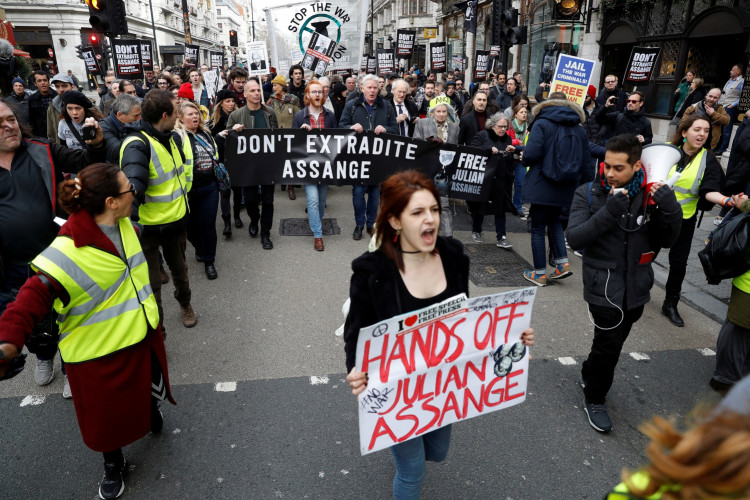Supporters of wanted publisher and activist Julian Assange are ready to go to battle with the WikiLeaks founder as the United States' request for his extradition will be heard by the United Kingdom on Monday.
According to The Guardian, supporters have started setting up tents outside the Woolwich Crown Court in London, the court building for Assange's extradition hearing, as early as Sunday evening.
A day earlier, John Shipton, Assange's father, addressed supporters who marched around central London and ended at the Parliament Square. Shipton also said that should his son be extradited, it would be equivalent to a "death sentence."
Shipton also told reporters that before he visited Assange behind bars on Sunday, the latter was reportedly "harassed" during a prison cell search. He said he still does not understand why Assange was jailed without committing a crime.
Assange is faced with 18 charges in the U.S., including his alleged cooperation with former army intelligence analyst Chelsea Manning in the leaking of classified American documents to the public.
For Assange's part in the battle against the U.S. military, he said after the charges were filed that he was protected by the First Amendment due to his work as a journalist. He added that the documents were an exposé of the faults within the military.
Assange's lawyer, Jennifer Robinson, said that the case sheds light on how investigative work being done by journalists, especially in terms of enlightenment on the U.S. military movement during war, can be turned into criminal activities, Reuters reported.
"They are a remarkable source for those of us seeking to hold governments to account for abuses," Robinson said, referring to the leaked documents and video Assange outed to the public 10 years ago.
While Assange is treated as an enemy of the state by government leaders who criticized his move in 2010, his supporters believe that he is a hero for exposing the abuse of power that some have committed even in critical situations.
Should British judges decide in favor of the United States, Assange still has the right to submit an appeal to the Supreme Court or the High Court in London.
Veteran journalist Patrick Cockburn wrote in an op-ed for The Independent that ever since Assange published the confidential documents through WikiLeaks, he was targeted by U.S. officials in a bid to discredit the information he released.
Cockburn noted that while the White House has been arguing that Assange's WikiLeaks put lives at risk, there has been evidence whatsoever that lives were endangered due to the leaks.
The veteran correspondent went on to note that other journalists have also outed government secrets but were not faced with charges or official sanctions close to what Assange is experiencing.
If extradited, Assange is expected to face a sentence of up to 175 years behind bars under the U.S. Espionage Act of 1917.






